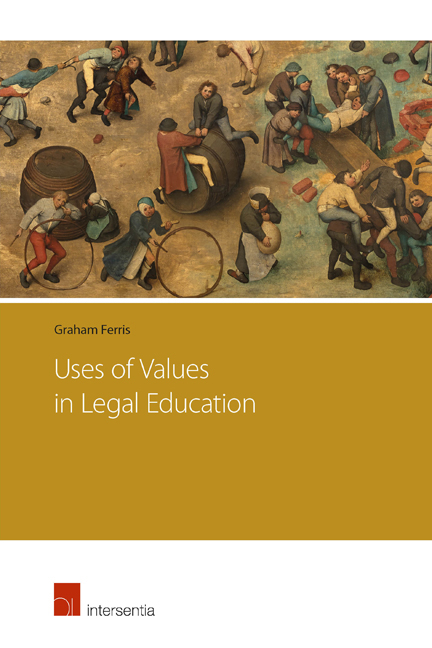Book contents
- Frontmatter
- Dedication
- Foreword
- Preface
- Acknowledgements
- Contents
- PART I STATUS QUO AND WHERE TO GO
- Chapter 1 The Values of Legal Educators
- Chapter 2 Is it the Duty of Educators to Care What is in the Best Interests of Students?
- Chapter 3 The Content of a Value-Informed Curriculum
- PART II HOW VALUES SUPPORT LEARNING
- PART III TEACHING ETHICS
- Table of Cases
- Bibliography
- Index
Chapter 3 - The Content of a Value-Informed Curriculum
from PART I - STATUS QUO AND WHERE TO GO
Published online by Cambridge University Press: 22 November 2017
- Frontmatter
- Dedication
- Foreword
- Preface
- Acknowledgements
- Contents
- PART I STATUS QUO AND WHERE TO GO
- Chapter 1 The Values of Legal Educators
- Chapter 2 Is it the Duty of Educators to Care What is in the Best Interests of Students?
- Chapter 3 The Content of a Value-Informed Curriculum
- PART II HOW VALUES SUPPORT LEARNING
- PART III TEACHING ETHICS
- Table of Cases
- Bibliography
- Index
Summary
Chapter 1 was concerned with the values academics and educational institutions should bring to higher education generally and legal education specifically. It argued that a concern to align education to the interests of students was a primary ethical duty. Chapter 2 tried to demonstrate why the responsibility for such alignment could not be left to the market, via consumer choice, and why we had good reason to suppose law students are unable to thrive under our current system. Hence, suggesting that we need to consider how to re-align legal education with the interests of students in the common law world. This chapter tries to identify generally acceptable legal values that can be used to inform legal education. Obviously, the lack of any unitary value system in modern society makes this task more difficult. Two types of value are sought below.
First, I try to identify values that can be used to evaluate legal systems. These are substantive values that must be justifiable from a perspective outside the legal discourse. Values that are wholly internal to the legal system risk collapsing into self-congratulatory rationalisation of the law and legal practice. However, internalisation of values should not debar them from being used to evaluate the system; it would be self-defeating to oppose the adoption of valid criteria of evaluation because they were being used by the system being evaluated.
Second, I try to identify values generated by the legal system. Specifically, I consider values generated by the intermediary nature of law and legal practice. These values are likely to reflect the wholly internal criteria of excellence that the discipline recognises. They inform legal educational practice already. The nature of the links between system value and educational practice are oft en poorly articulated. An attempt is made to explore why and how educational practice can and does recognise these values.
Thus, the focus of this chapter is not subject matter. It is not concerned with the substantive law, or legal processes, or legal problems to be studied. Although the matters dealt with may suggest specific topics for study this is not the purpose of the discussion. The problem is to identify external and internal sources for values, and to identify the values that these sources provide.
- Type
- Chapter
- Information
- Uses of Values in Legal Education , pp. 67 - 114Publisher: IntersentiaPrint publication year: 2015



